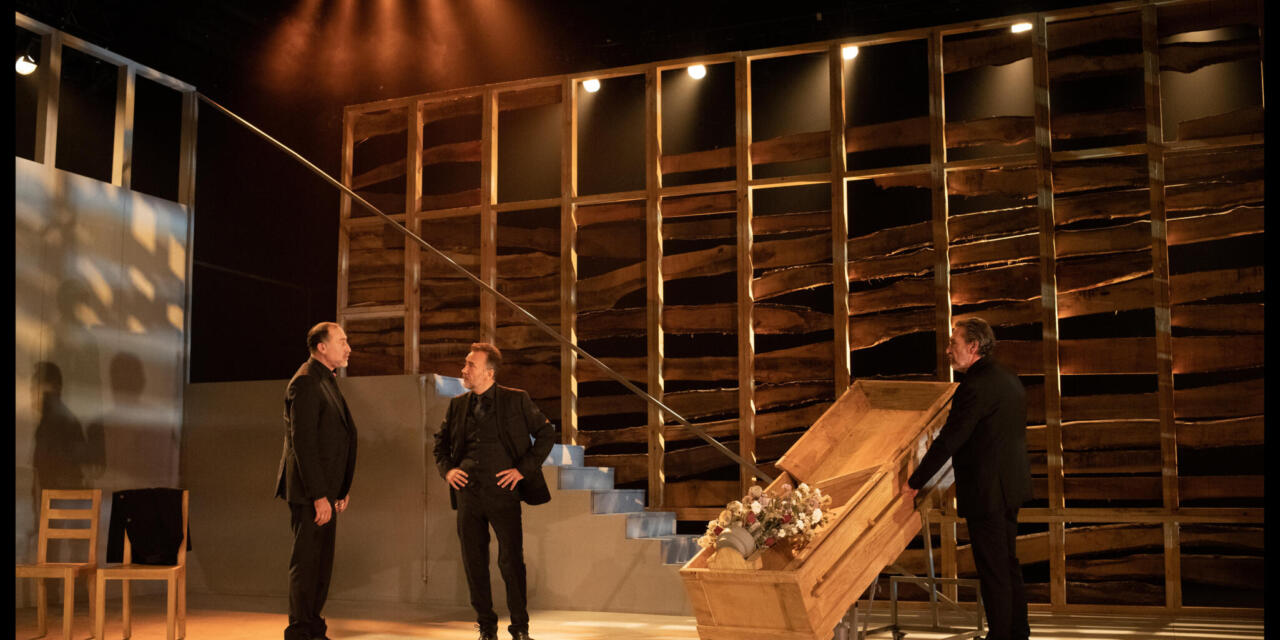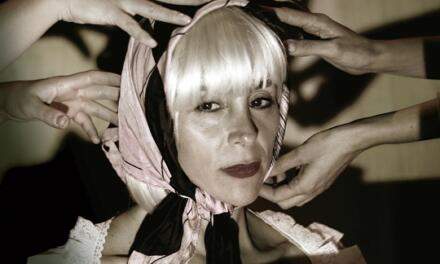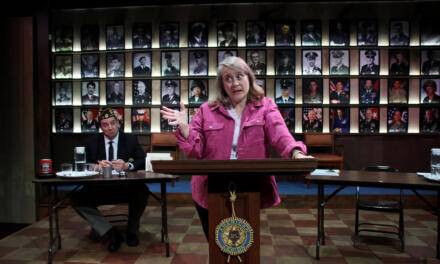Juan Mayorga, one of Spain’s most decorated dramatists — a member of Spain’s Spanish Royal Academy since 2019 and recipient of the Princess of Asturias Literature Prize in 2022 — is not averse to writing about thorny subjects. Ethical responsibilities, the legacy of difficult histories, historical memory, the faultlines of language and the complex ways in which the past is narrated have been core themes of his work to date. Amistad/Friendship — in its premiere production at Naves del Español at the Matadero arts complex in southern Madrid — marks something of a different direction for the playwright. Yes, it is rooted in the playful language games and unnerving black humour that often mark Mayorga’s work but the tone feels closer to boulevard comedy than anything else he has written to date. Written in 2017, between Reykjavik and El Golem, it is in many ways a play about toxic masculinity and asks pertinent questions about what passes for friendship in a relationship between three middle-aged friends who have known each other since childhood.
When the play opens Ufarte (José Luis García-Pérez who also directs) and Manglano (Ginés García Millán) are the sole mourners at a wake for their childhood pal Dumas (Daniel Albaladejo). There are sounds of a party outside — the wake scheduled against local offstage festivities that intrude periodically on the onstage action. A pine wooden coffin shows Dumas at peace, arms crossed across his chest with a jar of white flowers at his feet and two simple wooden chairs the only other pieces of furniture in the room. The set (designed by Alessio Meloni) looks at times like a garden fence – wooden slats at the back of the stage and a staircase through which the men, most especially alpha male and successful businessman Manglano, make dramatic entries and exits.
The men may have been friends for decades but the limited vocabulary that underpins their conversations demonstrates that they lack the emotional maturity to really discuss what friendship means to them. Manglano repeats incessantly that Dumas was “the best of the three of us,” – he first announces it at the top of the stairs at the play’s opening before descending dramatically as if making a dramatic stage entry. Empty rhetoric is the name of the game as the lofty statements on Dumas’ merits — none substantiated with examples — are undermined by throw away comments that illustrate a more problematic dynamic between the men. Pressing comments by Ugarte signal resentment and coverups with suggestions that Manglano is involved in an affair with Dumas’ widow, Marina — much invoked in the men’s conversations but never making an appearance on stage. When the conversation between Ugarte and Manglano awkwardly dries up after the initial pleasantries, the latter whips out his phone and shares an image of his new car with the admiring Ugarte. Grief manifests itself through instances of lamentation and cliched comments — often addressed by Manglano in a highly self-conscious manner to the audience. Indeed, these men are always performing the version of themselves they want the other two to see.
Manglano strides across the stage, phone regularly clamped to his ear as he answers a regular string of calls. He performs the role of a “busy” businessman with a singular focus, confirmed by the other two men who speak of his lucrative company with slivers of resentment evident in their words. The vision of Dumas presented – convinced he was the illegitimate son of the Duke of Alba, with a drink problem, a limited repertoire of bad jokes, and money problems — points to something of a fantasist. He is shown to have borrowed money from both Ugarte and Manglano — the revelation brings the men’s competitive spirit bubbling to the surface once more. The play’s twist comes when Dumas rises from the coffin and Ugarte takes his place — a game that allows each of the men the opportunity to hear what his friends really think of him.
There is a similar pattern to the play’s remaining two sections as Manglano replaces Ugarte in the coffin and further instances of the men’s interweaving lives unravel. Ugarte’s son works with Manglano who set up a company arising from an idea of Dumas – the latter side-lined as the company grew. The men’s bonding seems to take place around marathon runs and football games — rituals that allow them to either demonstrate their masculine prowess or bond over sportsmen demonstrating theirs. Chess analogies — that Manglano never quite manages to control — proliferate. With their trimmed beards and black suits that all boast a similar cut, the men share a certain physical appearance that suggests affinities. All fall back on empty posturing and pompous oratory whenever the situation arises, although subtle differences do distinguish them. Ugarte demonstrates an uncanny ability — likely honed over the many decades of their association — to master a put down of the mighty Manglano: “Manglano was the least able and now look at him…. The one who looked the oldest.” Manglano says of Dumas that he “never matured.” Whether Dumas on a deathbed scene asked Manglano to take care of his family is never corroborated: Manglano narrates the encounter with a veritable sense of theatricality.
And theatricality is key to the physical and vocal register selected by García-Pérez for the production. Manglano strides across the stage, used to holding court and getting his own way. Hands in pocket, he surveys the action around him and stands his ground. The gravelly-voiced Ugarte rolls his eyes and moves in a nervier manner. A dance with Dumas and a kiss on the lips point to homoerotic feelings that were perhaps never acknowledged or reciprocated. The bloody death that Ugarte and Dumas conceive for Manglano – multiple stab wounds – point to the uneasy tensions in the relationships. Even in the coffin, Manglano rises like a vampire when he feels Ugarte and Dumas have gone too far and tries desperately to stop the others prising his phone from his jacket’s inside pocket. At times it is as if the men are dancing around the coffin — Ugarte practicing ballet moves as he rests his hand on one side. Chairs are shifted across the stage to suggest moments of complicity, to signal a distance, to mark indignation or irritation and to enforce a temporary separation. These are men that can only converse in the language of cliches gleaned from sports reporting and popular culture.
Misogyny is, perhaps unsurprisingly never far from the surface: Marina had a relationship with all three and is conceived as someone who requires their help, a victim rather than an agent. “Women are friends in another way,” one of the men declares: it’s a statement that further positions them as immature and out of touch, unable to process their own feelings and emotions. Togetherness means one of the men has to be the butt of the others’ jokes. Their anthem, Tony Ronald’s 1971 hit song “Help, ayudame,” pops up as a rallying cry to help mobilise each other and the audience — who sing along to the rendition that comes along at the curtain call. The song’s call for help following a broken relationship appeals to the men’s sense of loyalty to each other but it’s a loyalty that, as the play shows, has its limits. At the play’s end as the men suggest taking their game out of the room and performing it at the festivities outside, there is a knowing laugh from the audience — as the metatheatrical motif comes to the fore. The ending feels very Mayorga — a dramatist who relishes metatheatrical gameplay and the opportunities it offers for asking what theatre is and how it operates.
A packed appreciate house responded with loud applause to the play’s end. Perhaps García-Pérez’s production relies too heavily on laughs; it felt overly laboured in its emphatic performance register. The piece’s playful metatheatricality arguably deserves a more nuanced staging. The piece may not have the sophistication of what I would see as Mayorga’s best pieces Himmelweig (Way to Heaven), Love Letters to Stalin or The Boy at the Back but it’s a timely piece on an understanding of friendship where everything is knowingly performed. And when the play perceptively scratches below the surface of this friendship, an undercurrent of resentment, umbrage and frustration demonstrates that “friendship” here isn’t quite what it may first appear.
Amistad/Friendship plays at the Naves del Español en el Matadero (Madrid) until 5 March 2023.
This post was written by the author in their personal capacity.The opinions expressed in this article are the author’s own and do not reflect the view of The Theatre Times, their staff or collaborators.
This post was written by Maria Delgado.
The views expressed here belong to the author and do not necessarily reflect our views and opinions.


















